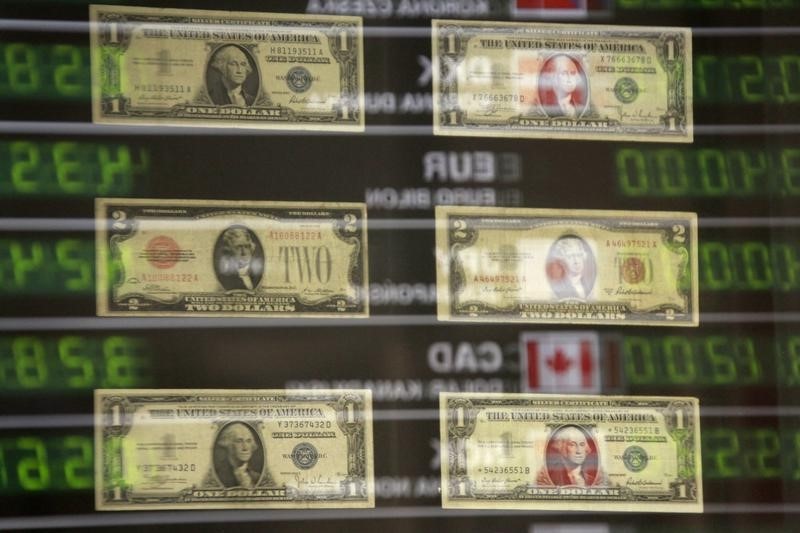* Indian rupee leads gains
* Singapore Oct industrial output unexpectedly rises
* Malaysian Ringgit weakens for a seventh session
(Adds text, updates prices)
By Shriya Ramakrishnan
Nov 26 (Reuters) - Emerging Asian currencies took less heart
than the dollar from signs of progress in U.S.-China
negotiations for a preliminary deal to end a prolonged trade
war, as investors refused to get carried away without more
detail on the content of talks.
China's Commerce Ministry said top trade negotiators from
both sides held a phone call on Tuesday, and discussed "core
issues of concern". "Asian currencies seem to be uninspired in spite of
encouraging headlines on the U.S.-China trade deal as concrete
details of the trade talks have been lacking," Fiona Lim, senior
FX strategist at Maybank, said.
"Investors could be worried about U.S.-China relations
souring further should Trump approve the Hong Kong bills."
China's foreign ministry summoned U.S. Ambassador Terry
Branstad on Monday to protest against the passing in the U.S.
Congress of the Hong Kong Human Rights and Democracy Act, saying
it amounted to interference in an internal Chinese matter.
China's yuan CNY=CFXS inched up, helped by a slightly
firmer central bank fixing, while trade-sensitive South Korean
won KRW=KFTC erased early gains to slip 0.1%.
The Singapore dollar SGD= was marginally lower.
Data on Tuesday showed Singapore' industrial output
unexpectedly rose in October, helped by a recovery in
electronics manufacturing - a key driver of growth for the
city-state. Meanwhile, the Taiwan dollar TWD=TP gained 0.1% to the
dollar. The island's trade-reliant economy posted a 2.9% fall in
industrial output for October, compared to a year earlier, data
on Monday showed.
The Indian rupee INR= was the top performer in the day,
advancing 0.2% to the dollar. Focus will now turn to the release
of second quarter growth figures on Friday.
The Indian economy expanded 5.0% in the April-June quarter
on a year earlier, its slowest annual pace since 2013, and was
expected to grow 4.7% last quarter, according to a Reuters poll.
AND TRADE UNCERTAINTIES PRESSURE RINGGIT
The Malaysian ringgit MYR= depreciated 0.1% to the dollar,
weakening for a seventh straight day.
Analysts said that uncertainties surrounding the U.S.-China
trade deal and domestic political issues were weighing on the
ringgit.
Earlier this month, Malaysia's ruling coalition suffered its
worst electoral defeat since coming to power last May,
uncovering deepening cracks in an alliance mired in uncertainty
over a succession plan once Prime Minister Mahathir Mohamad
retires. "I think international investors are starting to get a
little nervous about what the political landscape would be,"
Jeffrey Halley, Senior Market Analyst, Asia Pacific, at OANDA
said.
CURRENCIES VS U.S. DOLLAR
Change on the day at 0527 GMT
Currency Latest bid Previous day Pct Move
Japan yen 108.990 108.9 -0.08
Sing dlr 1.365 1.3645 -0.05
Taiwan dlr 30.490 30.507 +0.06
Korean won 1176.700 1176 -0.06
Baht 30.220 30.225 +0.02
Peso 50.740 50.81 +0.14
Rupiah 14080.000 14070 -0.07
Rupee 71.610 71.73 +0.16
Ringgit 4.179 4.177 -0.05
Yuan 7.029 7.0355 +0.10
Change so far in 2019
Currency Latest bid End 2018 Pct Move
Japan yen 108.990 109.56 +0.52
Sing dlr 1.365 1.3627 -0.18
Taiwan dlr 30.490 30.733 +0.80
Korean won 1176.700 1115.70 -5.18
Baht 30.220 32.55 +7.71
Peso 50.740 52.47 +3.41
Rupiah 14080.000 14375 +2.10
Rupee 71.610 69.77 -2.57
Ringgit 4.179 4.1300 -1.17
Yuan 7.029 6.8730 -2.22
